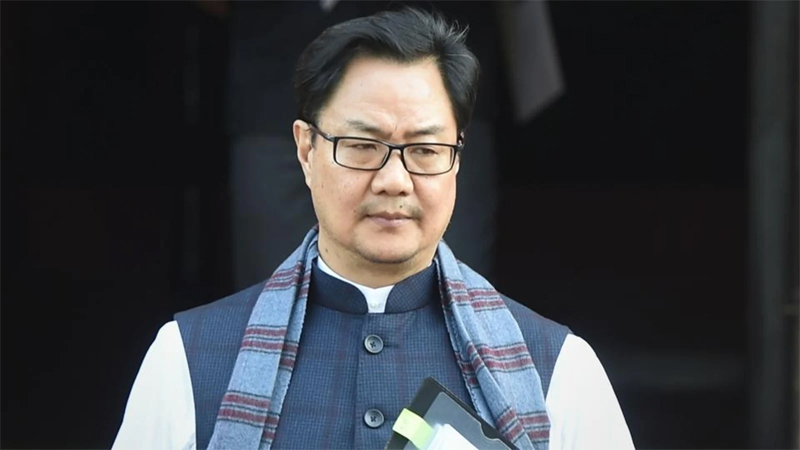‘Had Nehru acted in time, there would have been no PoJK’
Modi corrected mistakes by nullifying Art 370
Sanjeev Pargal
JAMMU, Oct 27: Union Minister for Law and Justice Kiren Rijiju today elaborated on five Nehruvian blunders on Kashmir and asserted that it was Prime Minister Narendra Modi who corrected them by nullifying Article 370, which granted erstwhile State of Jammu and Kashmir the special status.
He used the 75th anniversary of Jammu and Kashmir’s accession to India to further “expose” Jawahar Lal Nehru, the first Prime Minister of the country and a Congress leader. Few days back also, Rijiju had tweeted quotes from the history to say that it was Nehru who delayed Jammu and Kashmir’s accession with India.
In an article written today, Rijiju cited “five Nehruvian blunders” including rejecting Maharaja Hari Singh’s request for accession in July 1947 itself to advance a personal agenda, declaring eventful accession as provisional, approaching United Nations Organisation under Article 35 and not Article 51, letting the myth perpetrate that UN mandate plebiscite was in any way an open question and institutionalizing the separatist mindset by creating Article 370.
“Seven decades were lost due to these Nehruvian blunders and India paid a have price,” he said and added that finally, history took a turn in 2019 when India First was the only guiding principle and Prime Minister Narendra Modi undid the five “Kashmir blunders of Nehru” by annulling Article 370 and fully integrating Jammu and Kashmir with India.
“It was important to realise past mistakes to build a new future. I haven’t tweaked history but stated facts to set the record straight,” the Law and Justice Minister said.
He said a historical lie has been perpetrated for past seven decades that Kashmir was also among the princely States that created problems in joining India. As documents now reveal, it was Nehru who created these problems and not Maharaja Hari Singh, he added and said the first Prime Minister did this to fulfil his “personal agenda”.
“The vacuum that Nehru created in Kashmir allowed Pakistan to meddle and ultimately its forces, in the guise of local tribals, invaded the territory of Kashmir on October 20, 1947. Even then, Nehru was unmoved, Pakistani forces were rapidly advancing in Kashmir. Maharaja Hari Singh again pleaded with Nehru to join the Indian Union. But Nehru was still negotiating to fulfil his personal agenda,” Rijiju wrote.
Quoting Nehru’s letter to then Jammu and Kashmir’s Prime Minister, MC (Mehar Chand) Mahajan, the Union Minister said installing Sheikh Abdullah, his best friend, in power was more important for Nehru than integrating Kashmir irrevocably with India.
“As late as October 26, 1947, with Pakistani forces knocking on the gates of Srinagar, Nehru was still juxtaposing his personal agenda with what his national data demanded. Finally, the instrument of accession was accepted on October 27, 1947 and the Indian forces landed in Kashmir and started repelling the Pakistani invaders,” he wrote and said: “entire Kashmir history could have been so different. The matter of accession could have ended in July 1947 itself.”.
Rijiju said with the issue of accession settled (unlike the limbo that actually existed), there would have been no Pakistan invasion, no Pakistan occupied Jammu and Kashmir (PoJK), no reference to the United Nations, no locus for Pakistan to fight the wars on Kashmir in later decades, no jihadi terrorism and no uprooting of Kashmiri Hindus in 1990. As late as October 21, 1947, if Nehru had acted in time, there would still be no PoJK, he added.
“Maharaja Hari Singh signed exactly the same instrument of accession as every other princely State. All other princely States were unambiguously integrated into the Union, except Kashmir. Because it was Nehru himself, not the Maharaja, who declared the accession provisional,” the Law and Justice Minister said.
He added that another Nehruvian blunder on Kashmir was to approach the United Nations on January 1, 1948 under Article 35 which deals with disputed lands rather than Article 51 which would have been the correct Article to highlight Pakistan’s illegal occupation of Indian territory.
“The Maharaja signed only one instrument of accession–that with India, Yet, it was Nehru who gave a locus to Pakistan by himself accepting Kashmir as a dispute between India and Pakistan. Since then, the UN resolutions continued to haunt India,” Rijiju wrote.
He listed fourth Nehruvian blunder on Kashmir to let the myth perpetrate that a UN-mandated plebiscite in Kashmir was being stopped by India.
The fifth Nehruvian blunder on Kashmir was the creation and perpetuation of Article 370 (Article 306A in the interim draft of the Constitution). In the first instance, there was no justification for such an article as the instrument of accession was the same as every other princely State was signed. The only `special’ case that existed was in Nehru’s mind.


